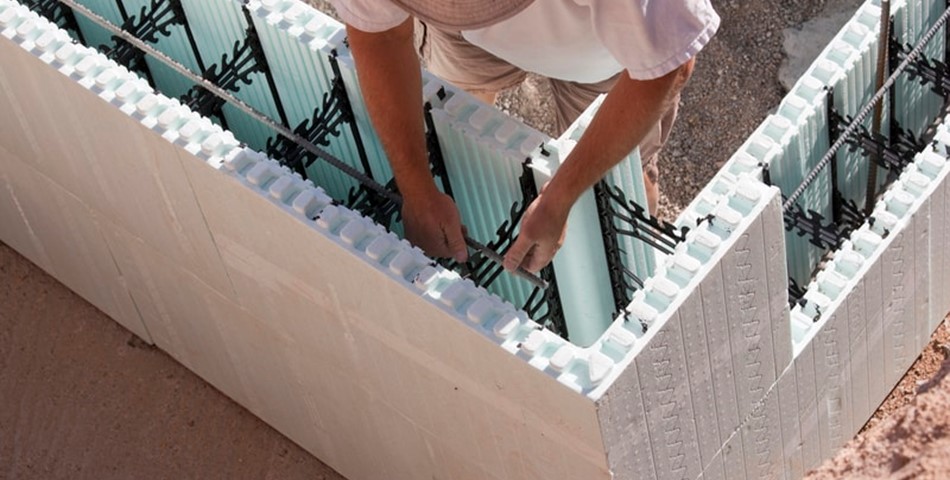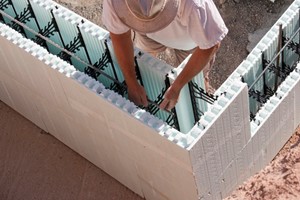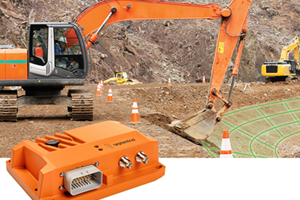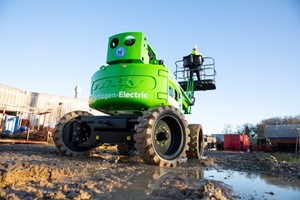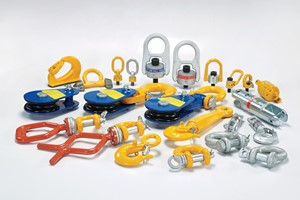They tend to be found in new construction versus in older buildings that have been renovated. This modern building material is usually made of blocks of polystyrene foam with space in between to pour a concrete wall. While this process is most commonly used for foundation walls, many contractors and construction companies are now taking ICF to the next level by using them for above-grade walls of one, two and three-story homes.
ICF blocks come in interlocking sections. Once installed, the wall system fits tightly together. When the blocks are in place, concrete is poured, then finishes like drywall and siding are attached to fastener strips embedded in the insulation.
The benefits of choosing ICF are many. It acts as an excellent insulator. Not only does it seal well, preventing air leakage through the walls … it also has two continuous insulation layers, one interior and one exterior, with no thermal bridges. This reduces heat loss in your building, making it very energy efficient. It can also provide greater comfort – maintaining consistent temperatures with no chilly draft coming through.
Energy efficiency and eco-friendliness should be at the forefront of every homeowner's mind. Not only is it wise to lower your utility bills as much as possible, it's also every citizen's responsibility to start lowering his or her own carbon footprint. Despite the shift to LED lighting and efficient HVAC systems, many homes are still lagging when it comes to their walls and insulation.
Insulation upgrades are generally considered a great investment. But regardless of what method you are implementing, it could be a never-ending losing battle. This is because traditional wall construction allows for only so much of a protective barrier and thus a constant stream of heated or cooled air being lost out the walls. An Insulated Concrete Form (ICF) plan could be answer.
What is ICF?
Insulated Concrete Forms are essentially a “wall sandwich.” They are two layers of insulating material with a substantial (4- to 12-inch-thck) cast-in-place concrete slab in between them. Instead of a thin sheet of drywall and a vulnerable layer of insulation, air must now try to penetrate two thick panels of rigid foam and a reinforced concrete wall. The result is not only an incredible increase in energy efficiency but also thermal and structural improvements.
ICFs are used in everything from residential to commercial to industrial buildings. Traditional finishes and materials can be applied to both the exterior and interior faces (siding, paneling, etc.) so the styles resemble timber-constructed home plans. The process was initially used only for high-end buildings in the early- to mid-1990s because of the cost. Today, an influx in energy-efficiency consciousness combined with more precise manufacturing methods have made ICF building viable for almost any type of construction.
Advantages for Both Homeowners and Contractors
ICF construction has become not only a popular option but rather almost a preferred building method for both homeowners as well as contractors. The benefits that are most appealing to property owners include:
- Strength – thick concrete forms hold up much better to high winds and even seismic events much better than virtually every other type of wall. They support vertical loads better as well and minimize shifting over the years.
- Safety – when it comes to resisting weather events it's not just about not having to delve into your homeowner's insurance – it's about you and your loved ones staying safe. Concrete form walls are the most durable in the industry.
- Energy Efficiency – ICF walls are admittedly more costly than traditional building methods up-front, but the real value must be determined over the long haul. Insulated concrete has the minimal air seepage of any building method and will thus provide lower utility bills starting on day one. HVAC systems don't have to work as hard either, so their life span is increased.
- Comfort – when your home or business is free of drafts and air loss it means that the surroundings are much more comfortable to inhabit.
- Decay- and Insect-Resistant – besides weather ICF also is resistant to the mold, mildew, insects, and rot that destroy many traditional building materials.
- Sound Blocking – if you live in a busy neighborhood the soundproofing qualities of insulated concrete forms can be a godsend.
On paper it would be assumed that contractors would prefer the more familiar, traditional method of timber framing a home. The truth is implementing ICF also benefits the person installing them in ways such as:
- ICF construction is a quick, efficient process.
- ICF forms have the same flexibility that lumber offers.
- The forms themselves are lightweight and easy to ship. Once they are set up pouring the concrete is a breeze.
- ICF is just as compatible with other trades as timber. Accommodations are easily made for plumbers, electricians, framers, and finishers.
- Contractors can meet higher energy code requirements without additional costs or labor.
Although the materials prices may be higher with ICF, the efficient labor can balance the cost compared to lumber building




